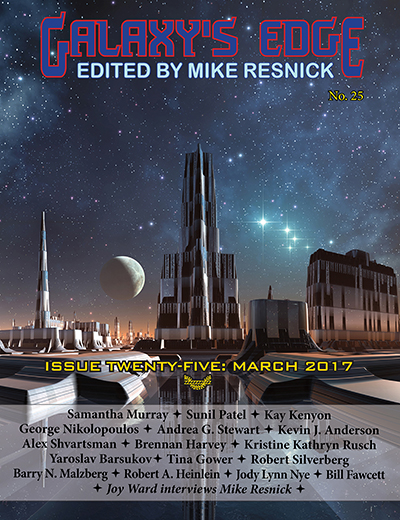(1) DON’T PAY TO PLAY. Jason Sanford has a twitter thread about another dodgy publisher – start here:
We pay all our authors.
— Cambridge Writers’ Workshop (@CamWritersWkshp) March 13, 2018
(2) TERMS AND CONDITIONS. Amanda S. Green has a very sensible take about the disappearing Amazon review kerfuffle: “On Reviews” at Mad Genius Club.
But, before you start all this take a step back and then take a deep breath and ask yourself if you or the reader who left the review might have fallen afoul of the rules. I know how easy it is to tell your other writer friends that you’ll review their work if they review yours. You might not even do it in so many words. The problem is, in this day and age of technology, Amazon’s computers will start seeing patterns and will pull reviews that fit those patterns. Is it fair? Waggles hands. It is, however, in the rules and we agree to those rules when we open our Amazon accounts and when we then open our KDP accounts. This is why you need to be sure you read those ToS agreements before completing your account setup.
Reviews are the best advertising we have for our books. They are a way of telling potential readers we’ve put something out that is worth not only their time but their money as well. Amazon recognizes that. It also recognizes the fact the system is easily gamed and that is what these rules are designed to prevent. The rules aren’t perfect but they are the best we have right now. None of us want to return to the days of rampant sock puppet reviews — or at least we shouldn’t. After all, most readers will look askance at a book by an indie author with hundreds of reviews and not a one under 4-star. You need those lower level reviews to give legitimacy to your work.
So, if you are one of those authors who found reviews suddenly missing, contact Amazon and ask what happened. Review the ToS about reviews and move forward. Yes, it’s hard losing reviews but you’ll do yourself more good writing your next book than spending hours on the internet whinging about how evil Amazon is.
(3) DEMISE OF STEAMPUNK WORLD’S FAIR. Airship Ambassador reports “Steampunk World’s Fair – Cancelled”. The former management was deposed after sexual abuse allegations, but the group trying to pull off rescue has decided the task is impossible
After several weeks of discussions, and publicized business changes, following posts in late January revealing sexual abuse allegations,
Sexual abuse allegations crawling out of steampunk community (TW)
Time to Name Drop and Protect Newbies
the Silver Phoenix Society announced On February 20,2018, it was taking over the production of Steampunk World’s Fair.
…However, it was announced tonight, March 13, 2018, on the Steampunk World’s Fair Facebook page that Silver Phoenix Society’s involvement in the event was ending, effectively cancelling the May 2018 festival.
Screencaps of relevant Facebook posts and links to background articles can be found at Airship Ambassador.
(4) THOR FX. A BBC video about “The visual effects behind Thor 3” relates the fun of having to be able to redo everything at the last minute, and the skinny on mixes of CGI and live action — sometimes keeping just the face so the body could interact with (e.g.) lightning.
Al Moloney talks to Alexis Wajsbrot, the visual effects supervisor for Thor: Ragnarok. He explains how characters like the Hulk and Korg were brought to life.
(5) HAWKING OBIT. Dr. Stephen Hawking died March 14. The New York Times reports: “Stephen Hawking, Who Examined the Universe and Explained Black Holes, Dies at 76”.
…“Not since Albert Einstein has a scientist so captured the public imagination and endeared himself to tens of millions of people around the world,” Michio Kaku, a professor of theoretical physics at the City University of New York, said in an interview.
Dr. Hawking did that largely through his book “A Brief History of Time: From the Big Bang to Black Holes,” published in 1988. It has sold more than 10 million copies and inspired a documentary film by Errol Morris. The 2014 film about his life, “The Theory of Everything,” was nominated for several Academy Awards and Eddie Redmayne, who played Dr. Hawking, won the best-actor Oscar.
Scientifically, Dr. Hawking will be best remembered for a discovery so strange that it might be expressed in the form of a Zen koan: When is a black hole not black? When it explodes.
What is equally amazing is that he had a career at all. As a graduate student in 1963, he learned he had amyotrophic lateral sclerosis, a neuromuscular wasting disease also known as Lou Gehrig’s disease. He was given only a few years to live.
The disease reduced his bodily control to the flexing of a finger and voluntary eye movements but left his mental faculties untouched.
(6) DOWN TO THE WIRE. With the Hugo nominating deadline upon us, Doctor Science shares a longlist: “Brainstorming my Hugo nominations: Best Novel and Best Series”.
Hugo nominations have to be in by Friday, so I’m going to put up my longlist and hope the process of writing helps me make up my mind. I’m resurrecting my goodreads account to better keep track of what I’ve read (and what I started but did not finish, and why).
I thought I had already written and posted reviews of most of these, but apparently I wrote many only in my head….
(7) ISHER AND TRANTOR. Meanwhile, Edmonton’s Hugo Award Book Club tackles “Retro Hugos 1943 — Short Stories” and tries to put the contenders in the context of the time.
If there had never been another story published in the Foundation universe, The Encyclopedists would
have stood on its own – it encapsulates essentially all of the big ideas of the series: the mathematics of history, the decline and fall of an empire, and the ennobling positivist view of the ability of humanity to alter its destiny. While later stories built on this foundational story, everything that makes the Foundation series great was right there in this initial blueprint.
In this story, Asimov offers us the series’ most unforgettable – and quotable – protagonist Salvor Hardin, the mayor of Trantor. In the context of when this story was published, just five months after Pearl Harbor, his famous quote “violence is the last refuge of the incompetent,” might be seen as an surprising anti-war exhortation.
(8) WHEN NO MAN PURSUETH. Just to make sure there’d be some drama, before he went to FOGcon, Jon Del Arroz ran this twitter poll:
What should I wear to FogCon (Bay Area SF Con) tonight for broadcasting?
— Jon Del Arroz (@jondelarroz) March 10, 2018
Broadcasting what, you might ask? You weren’t the only one. Jon gives his version in: “Someone Tried To Get Me Kicked Out Of A Sci-Fi Convention… And You’ll Never Believe What Happened Next!” [Internet Archive]
…The man proceeded to grill me, rattling off questions in a challenging manner. “What are you doing here? Why? Are you intending on broadcasting here? Are you going to be bothering anyone?” They came in rapid succession, challenging…. I finally told him “this tone is getting pretty hostile,” as I wasn’t sure what he was getting at at all.
This is where things changed. His eyes widened a little and he said, “Oh!” The man dropped to his knees and smiled. “I’m 6’8? I guess that can be a little intimidating. Is this better?” His tone changed to something a little more humorous. Almost expertly, this man diffused the situation and the tension that had been escalating evaporated.
We started talking at length, and I learned this man was from the convention security, and that someone had complained about my presence there…
JDA was allowed to stay, and even buy a membership the next day after being vetted by the chair:
I showed up the next morning, migrated down stairs and asked to buy a ticket for the day. …I was just about to wrap up paying, when convention chairman Steven Schwartz asked me to step aside and chat with him.
It was frightening again. What was going to happen? Was this the “you need to vacate the premises” I was afraid of?
Just like the security fellow from the night before, Schwartz asked a couple of questions, his tone was pleasant, he had genuine concern — not only for the safety of others, but what blew me away was he was concerned for my safety as well. He asked some questions based on the absurd rumors propagated by Worldcon that I was some boogeyman, I let him know I never intended anything of the sort at any con nor even implied it — for FOGCon or Worldcon, and Schwartz took me as a man of my word (which I am), and told me if anyone tried to attack or harm me, he would defend me as surely as anyone else.
(9) WHEN REALITY MOVES FASTER THAN FICTION. Justina Ireland tweeted —
https://twitter.com/justinaireland/status/973545239427379200
— Leeza Robertson (@Leeza_Robertson) March 13, 2018
(10) VIDEO OF THE DAY. In “Bug Gaits for Animators” on Vimeo, Stephen Cunnane provides tips animators need to make sure bugs crawl properly.
[Thanks to JJ, Chip Hitchcock, Cat Eldridge, Carl Slaughter, Martin Morse Wooster, and Andrew Porter for some of these stories. Title credit goes to File 770 contributing editor of the day Daniel Dern.]



